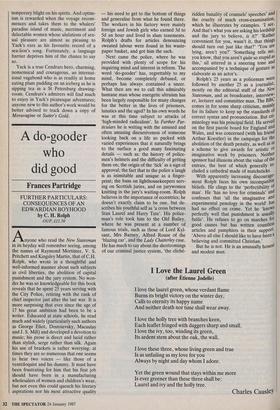A do-gooder who did good
Frances Partridge
FURTHER PARTICULARS: CONSEQUENCES OF AN EDWARDIAN BOYHOOD by C. H. Rolph OUP, £12.50 Anyone who read the New Statesman in its heyday will remember seeing, among the names of Raymond Mortimer, V. S. Pritchett and Kingsley Martin, that of C.H. Rolph, who wrote in a thoughtful and well-informed manner about such subjects as civil liberties, the abolition of capital punishment and the jury system. No won- der he was so knowledgeable for this book reveals that he spent 25 years serving with the City Police, retiring with the rank of chief inspector just after the last war. It is more surprising that ever since the age of 17 his great ambition had been to be a writer. Educated at state schools, he read much and widely (particularly such authors as George Eliot, Dostoievsky, Macaulay and J. S. Mill) and developed a devotion to music; his prose is direct and lucid rather than stylish, serge rather than silk. Again his use of brackets is rather worrying: at times they are so numerous that one seems to hear two voices — like those of a ventriloquist and his dummy. It must have been frustrating for him that his first job should have been in a manufacturing wholesalers of women and children's wear, but not even this could quench his literary aspirations nor his most attractive quality — his need to get to the bottom of things and generalise from what he found there. The workers in his factory were mainly foreign and Jewish girls who earned 3d to 5d an hour and lived in slum tenements. Rolph's drafts for articles denouncing sweated labour were found in his waste- paper basket, and got him the sack.
Next came the police, where he was provided with plenty of scope for his inquiring mind and interest in reform. The word 'do-gooder' has, regrettably to my mind, become completely debased, or perhaps has always contained a sneer. What then are we to call this admirably humane man whose energetic altruism has been largely responsible for many changes for the better in the lives of prisoners, lunatics and the aged? In his own words he was at this time subject to attacks of `high-minded radicalism'. In Further Par- ticulars he is writing with the amused and often amusing discursiveness of someone looking back on a life so packed with varied experiences that it naturally brings to the surface a good many fascinating details — such as: the history of police- men's helmets and the difficulty of getting them on; the origin of the 'tick' as a sign of approval; the fact that to the police a laugh is as inimitable and unique as a finger- print; the bans on lighthousekeepers serv- ing on Scottish juries, and on jurywomen knitting in the jury's waiting-room. Rolph believes in the importance of eccentrics; he doesn't exactly claim to be one, but de- scribes his youthful self as 'a cross between Stan Laurel and Harry Tate'. His police- man's role took him to the Old Bailey, where he was present at a number of famous trials, such as those of Lord Kyl- sant, Mrs Barney, Alfred Rouse of the `blazing car', and the Lady Chatterley case. He has much to say about the shortcomings of our criminal justice system, 'the cliché- ridden banality of counsels' speeches' and the cruelty of much cross-examination, which he illustrates by examples. 'I see. And that's what you are asking his lordship and the jury to believe, is it?' Rather convenient for you, wasn't it, that things should turn out just like that?' You are lying, aren't you?' Something tells me, you know, that you aren't quite so stupid as this,' all uttered in a sneering tone and accompanied by a technique of gesture as elaborate as an actor's.
Rolph's 25 years as a policeman were followed by another 25 as a journalist, mostly on the editorial staff of the New Statesman, and as broadcaster, interview- er, lecturer and committee man. The BBC comes in for some sharp criticism, mainlY for its failure to keep up the standards of correct syntax and pronunciation. But en- minology was his principal field. He served on the first parole board for England and, Wales, and was concerned (with his friend Arthur Koestler) in the campaign for the abolition of the death penalty, as well as in a scheme to give awards for artistic or imaginative work by prisoners. Neither sponsor had illusions about the value of the entries, the best of which generally le' cluded a cathedral made of matchsticks.
With apparently increasing discourage' ment Rolph faces his own incompatible beliefs. He clings to the 'perfectibility of, man'. He 'has no love for criminals' and confesses that 'all the imaginative and experimental penology in the world' has had no effect on crime. Yet he 'knows perfectly well that punishment is usuallY futile'. He refuses to go on marches for good causes but has written countless articles and pamphlets in their support. `Above all else I should like to have been a believing and committed Christian.' But he is not. He is an unusually honest and modest man.


















































 Previous page
Previous page